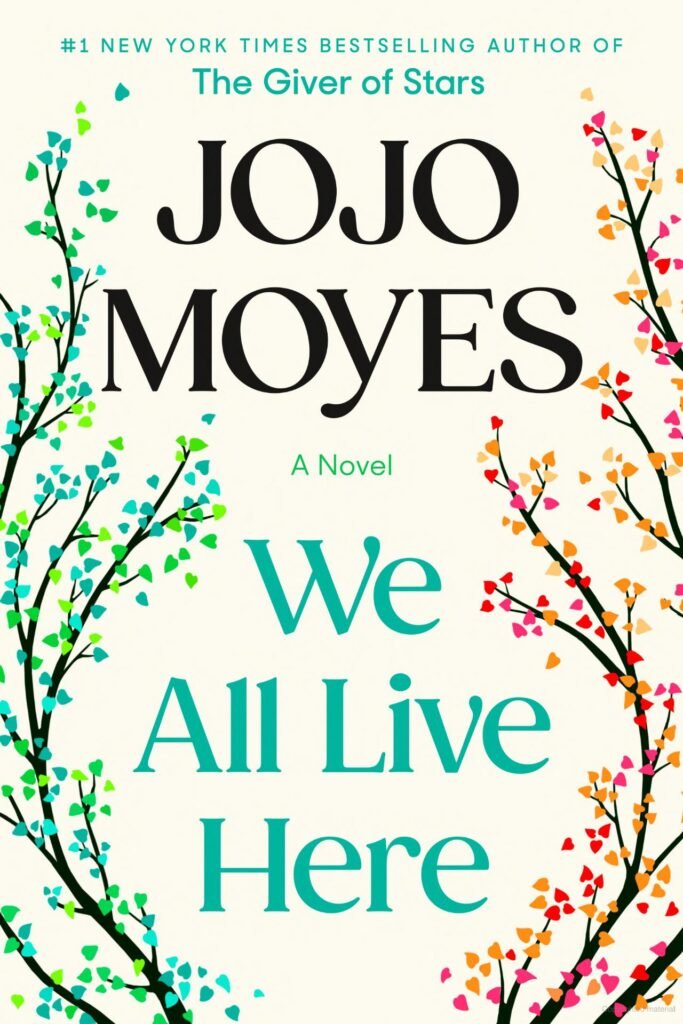Introduction to Jojo Moyes and Her Writing

Jojo Moyes is a renowned British author, recognized for her poignant storytelling and ability to delve into the intricacies of human relationships. Born on August 4, 1969, in London, Moyes began her career as a journalist, writing for publications such as The Independent and The Daily Telegraph. This journalistic background has undoubtedly influenced her approach to fiction, enabling her to create narratives that resonate with authenticity and emotional depth.
Her acclaimed novels often explore themes of family, love, and personal growth, articulated through relatable characters facing life’s challenges. Moyes gained immense popularity with her novel “Me Before You,” which not only became a bestseller but was also adapted into a successful film. This work, along with others such as “After You” and “The Giver of Stars,” showcases her signature blend of heart and humor, drawing readers into the worlds she meticulously crafts.
Jojo Moyes’s writing is characterized by her remarkable ability to balance the complexities of life with accessibility. Her characters, often flawed yet familiar, reflect the reader’s own experiences, allowing for an immersive literary experience. Moyes’s narratives encourage readers to reflect on their values and relationships, tapping into the universal emotions that bind humanity together. This connection is further enhanced by her vivid descriptions and engaging plotlines, making her books not just stories, but explorations of what it means to be human.
As we delve into her latest work, “We All Live Here,” it becomes evident why Moyes remains a beloved figure in contemporary literature. Her unique voice and storytelling prowess continue to captivate audiences, making her a significant contributor to the literary landscape. The intricate themes of this novel echo her established style while inviting readers to embark on yet another unforgettable journey of family, friendship, and love.
Overview of ‘We All Live Here’
‘We All Live Here’ by Jojo Moyes is a poignant exploration of the intricate relationships that define familial bonds and friendships. Set against a backdrop that mirrors contemporary social issues, the narrative transports readers to a vibrant community that becomes both a sanctuary and a battleground for the characters’ intertwined lives. The story follows several individuals who, drawn together by circumstance, navigate the complexities of their personal lives while grappling with external pressures.

The novel unfolds through the lives of its diverse cast, who each bring unique perspectives and experiences to the forefront. Moyes masterfully crafts characters that resonate with readers, illustrating how love and loyalty can both nurture and complicate relationships. The book immerses the reader in themes of community, as characters forge connections that reveal the underlying strength required to confront life’s challenges. It emphasizes that, despite differences, the essence of humanity binds individuals together, underscoring the idea that everyone needs a place to belong.
At its core, ‘We All Live Here’ delves into the dynamics of family, revealing how shared histories and unspoken tensions shape interactions. The friendships depicted in the novel, whether fraught with conflict or filled with support, highlight the significance of companionship in overcoming adversity. In particular, the narrative sheds light on contemporary issues such as social responsibility, empathy, and the importance of building supportive environments within communities. This expansive scope gives readers a chance to reflect on their own lives, prompting them to consider how the threads of friendship and family weave into the fabric of their existence.
Character Analysis: Key Figures in ‘We All Live Here’
In Jojo Moyes’ ‘We All Live Here’, the tapestry of characters showcases a diverse range of personalities that drive the narrative forward. Each character embodies various themes, including love, friendship, and the trials of life, contributing to the story’s richness and depth.
At the heart of the story is the protagonist, whom we see navigate through personal struggles and relationships with others. This character’s journey is marked by growth, as they confront past traumas and work towards self-discovery. Their motivations often stem from a desire for acceptance and belonging, which resonates throughout the plot. This depth allows readers to connect with their emotional landscape, ultimately revealing the powerful theme of resilience in face of adversity.
Another significant character is a supportive friend, whose loyalty and compassion serve as a cornerstone for the protagonist. This dynamic relationship highlights the importance of friendship and emotional support during challenging times. Their interactions are fraught with honesty, leading to moments of conflict but also profound understanding. The way they challenge each other reflects the complexities of human relationships, illustrating that love can be both nurturing and tumultuous.
Furthermore, family dynamics play a crucial role in shaping the characters’ motivations and decisions. Various family members embody different responses to love and obligation, creating a microcosm that mirrors societal values. Through their relationships, Moyes explores themes of sacrifice, unconditional love, and the sometimes painful reality of familial expectations. The struggles faced by these characters resonate deeply, mirroring real-life challenges many individuals encounter, be it in their families or friendships.
Overall, the characters in ‘We All Live Here’ serve as vessels for exploring essential life themes, making their journeys relatable and poignant. Their development emphasizes the enduring power of love and compassion, which ultimately intertwines with the broader narrative of the story.
Themes of Family and Friendship

In Jojo Moyes’ We All Live Here, the themes of family and friendship are intricately woven into the narrative, significantly shaping the characters’ experiences and decisions. The story explores various dimensions of familial obligations, emphasizing how these ties can both empower and burden individuals. Characters face challenging situations where their loyalty to family members demands sacrifices that test their strength and resolve. This complex interplay underscores the notion that while family can be a source of unconditional support, it can also impose expectations that may hinder personal growth.
Friendship, in contrast, emerges as a vital counterbalance to familial duty. Throughout the text, the importance of chosen families is brought to light, illustrating how friendships can provide refuge and resilience. The characters often find solace and understanding in their relationships with friends, who stand by them during times of crisis. This theme speaks to the idea that while biological ties may influence our lives, the bonds of friendship can be equally, if not more, significant. Through various interactions, Moyes demonstrates how friendships can evolve into profound connections that offer emotional sustenance.
Moreover, the narrative delves into the essence of loyalty and support among friends. Instances where characters rally around one another in moments of need depict a community spirit that is foundational for survival. This solidarity not only reinforces their emotional bonds but also exemplifies the profound impact of empathy and kindness in navigating life’s complexities. Ultimately, We All Live Here advocates for the understanding that family and friendship together create a rich tapestry of human experience, highlighting that genuine connections often transcend conventional definitions of kinship.
The Role of Love and Compassion
In Jojo Moyes’ narrative “We All Live Here,” love and compassion are not merely thematic elements; they serve as fundamental forces that guide the characters through their journeys. From the outset, the story highlights how the bonds formed through love can dramatically alter the course of lives. Each character navigates their personal struggles, yet it is often through acts of kindness that significant transformations occur. For instance, subtle gestures of affection or support become the turning points in various relationships, reflecting how love can offer solace in turbulent times.
The complexity of love is poignantly depicted through the characters’ vulnerabilities. Moyes masterfully illustrates that love is not always a straightforward experience; it can bring forth insecurities and fears alongside joy. As characters confront their past traumas and the inevitability of change, their emotional resilience is often tested. However, it is through moments of genuine compassion that they find strength to move forward. These instances not only propel the plot but also resonate with readers on a deeply emotional level. They remind us that love, in its many forms, has the power to heal and unite even the most disparate of individuals.
The theme of compassion further amplifies the narrative’s depth. Characters consistently choose to extend kindness, even in the face of personal challenges. These interactions create a ripple effect, exemplifying how one act of love can inspire others to pay it forward. Through these connections, Moyes cultivates a poignant reminder of humanity’s capacity for understanding and empathy. Ultimately, “We All Live Here” underscores the transformative impact of love and compassion, portraying them as vital forces that shape not only the characters’ lives but also reflect the universal human experience. As readers, we find ourselves drawn into this exploration of the emotional undercurrents that bind us all.
Lessons Learned: What Matters Most
Jojo Moyes’ “We All Live Here” serves as a poignant reminder of the core values that anchor our existence, particularly in times of upheaval and uncertainty. One of the book’s essential lessons revolves around the importance of connection. Throughout the narrative, characters navigate their complex relationships, revealing that the bonds formed with family and friends are vital to personal well-being. These connections provide emotional support, enabling individuals to face challenges more resiliently. The story exemplifies how nurturing these relationships can lead not only to personal growth but also to a greater sense of community.
Empathy emerges as another crucial theme in the book. Moyes illustrates how understanding the trials and tribulations of others can foster compassion in our interactions. The characters’ journeys compel us to consider the perspectives of those around us, regardless of their backgrounds or circumstances. In a world that often emphasizes individualism, “We All Live Here” challenges us to engage with empathy, advocating for a more inclusive society. This underlying message encourages readers to reflect on their own behavior and the impact their actions have on others, driving home the concept that we are all interconnected.
Understanding is also a key takeaway from Moyes’ work. The narrative encourages readers to appreciate and accept differences, which can lead to stronger relationships. As one navigates through the various challenges presented in the book, the importance of listening and being open-minded becomes clear. In today’s fast-paced world, where differences can easily lead to division, Moyes’ emphasis on understanding serves as a vital reminder to cherish and respect the diverse tapestry of human experience.
Ultimately, “We All Live Here” invites readers to reflect on what truly matters in life, offering profound insights that remain relevant in our contemporary landscape.
Critical Reception and Reader Responses
Since its release, Jojo Moyes’ We All Live Here has garnered considerable attention from both literary critics and readers alike. The book’s exploration of intricate themes such as family dynamics, camaraderie, and the nuances of love has struck a chord with many. Critics have lauded Moyes for her ability to weave relatable characters and poignant narratives that reflect real-life complexities. Many reviews highlight her signature style of blending humor with emotional depth, effectively drawing readers into the characters’ journeys.
Positive reviews emphasize the book’s engaging storytelling and rich character development. Critics have noted that Moyes successfully captures the essence of familial relations and the bonds of friendship, making the narrative both heartfelt and authentic. Additionally, the varied perspectives presented in the novel have allowed readers to connect with the story on multiple levels. This multi-dimensional approach is often regarded as one of the book’s strongest points, providing insights into how different people navigate love and relationships.
Feedback from readers has further underscored the novel’s impact. Many have expressed appreciation for the relatable scenarios and emotional truths depicted in the narrative. Online reviews often mention how the story resonated with their personal experiences, particularly the challenges and joys of forging connections with family and friends. However, some critiques have emerged, focusing on pacing issues and certain character arcs that readers felt could have been explored more deeply. Despite these criticisms, the overall reception remains largely positive, affirming Moyes’ reputation as a skilled storyteller.
In summary, We All Live Here has been embraced by both critics and the broader audience, with its themes of love and friendship resonating profoundly. As Moyes continues to evolve as a writer, this novel stands as a testament to her enduring ability to touch hearts and inspire conversations about the human experience.
Comparative Analysis: Jojo Moyes and Contemporary Authors
Jojo Moyes has carved a unique niche for herself in contemporary literature with her intricate narratives and relatable characters. “We All Live Here” reflects her signature style, which often intertwines complex relationships with socio-emotional themes. This approach draws parallels with other contemporary authors, such as Marian Keyes and Taylor Jenkins Reid, who similarly explore the intricacies of family and friendship within their narratives.
Moyes, known for her bestsellers like “Me Before You,” employs rich character development that resonates deeply with her audience. In “We All Live Here,” we observe her mastery in portraying multifaceted characters who confront personal dilemmas and relational struggles. This technique resembles Keyes’ work, where humor meets heart, providing a nuanced perspective on life’s challenges. Similarly, Reid’s novels often highlight themes of love and personal growth, making Moyes’ narratives relatable in the broader context of contemporary literature.
Moreover, the thematic exploration of loss, resilience, and belonging is prevalent in Moyes’ writing, mirroring the works of other contemporary authors who engage with similar motifs. These shared themes create a connective thread, allowing readers to navigate their own realities through the fictional journeys presented in these novels. For instance, the emotional depth found in Moyes’ writings is reminiscent of Reid’s exploration of complex female friendships and personal evolution, facilitating an emotional bond that transcends the pages.
What distinguishes Moyes in this landscape, however, is her ability to blend humor with poignant storytelling, creating a balanced narrative that encourages both laughter and introspection. Her characters often embody relatable flaws and triumphs, enabling readers to see fragments of their own experiences within the story. This level of connection is vital in contemporary literature, making her work impactful and enduring in the minds of her readers, as they grapple with universal themes that are prevalent in their own lives.
Conclusion: The Impact of ‘We All Live Here’
‘We All Live Here’ by Jojo Moyes serves as a poignant exploration of profound themes that resonate deeply with readers. The novel delineates the intricate web of family dynamics, friendships, and the unconditional nature of love. Through its compelling narrative, Moyes invites us to reflect on our own relationships, compelling us to assess what binds us to one another in our lives. The story not only captivates through its engaging plot but also enlightens its audience on important societal messages regarding kindness and empathy.
The impact of ‘We All Live Here’ extends beyond mere entertainment; it fosters an introspective journey for readers, prompting them to contemplate their values and the connections they forge with others. The book emphasizes the importance of fostering meaningful relationships and showcases how acts of love and kindness can create lasting bonds. In an increasingly disconnected world, Moyes’ narrative reminds us of the significance of community and the human experience, encouraging us to nurture the bonds we have.
